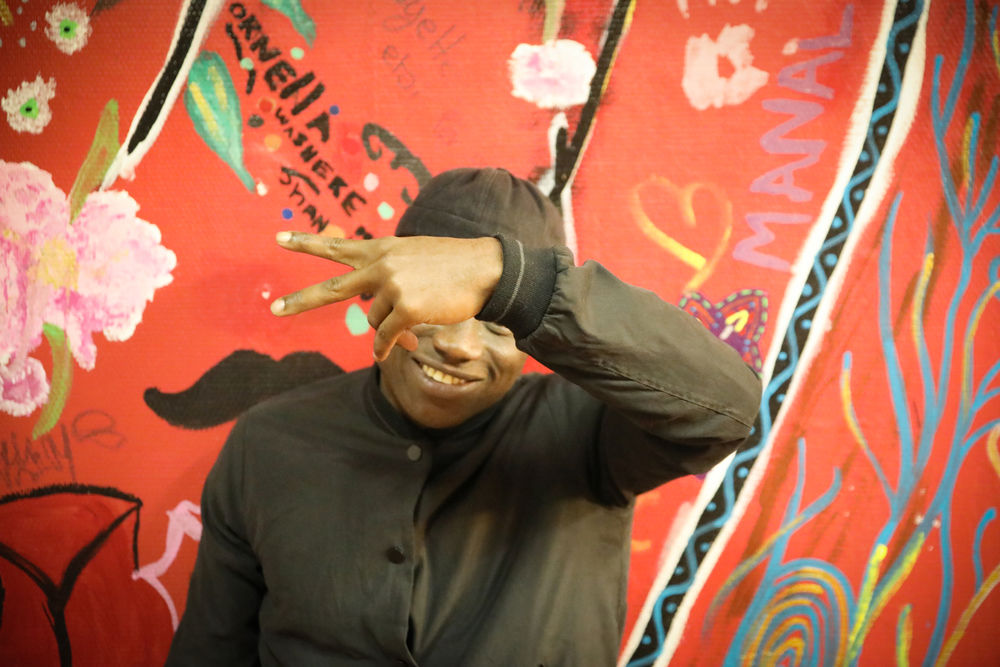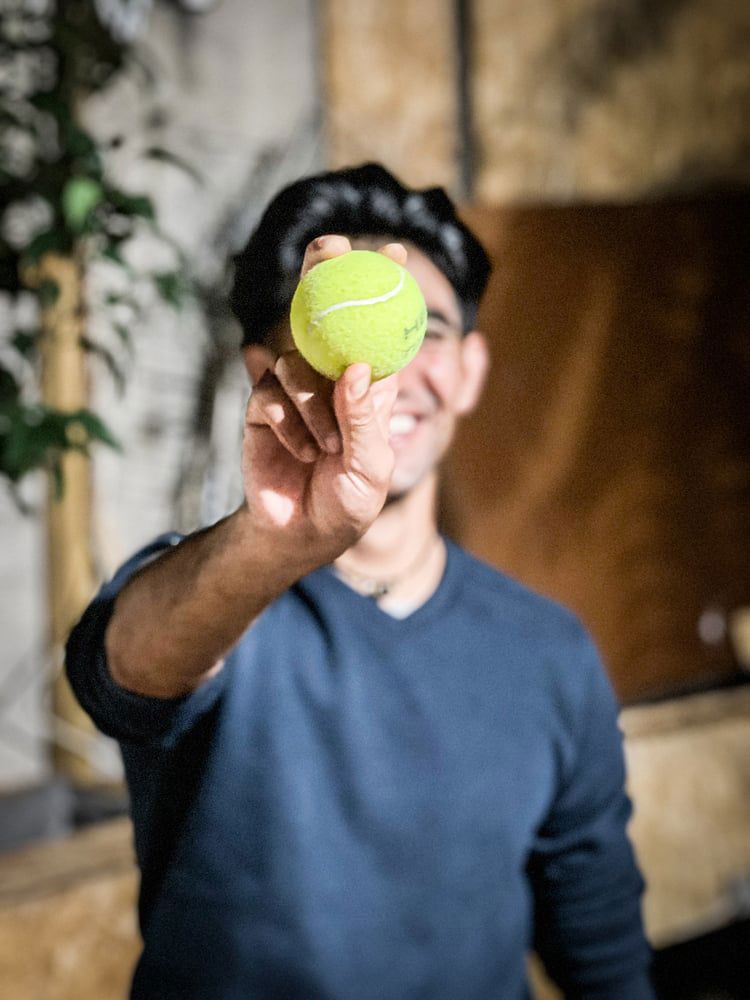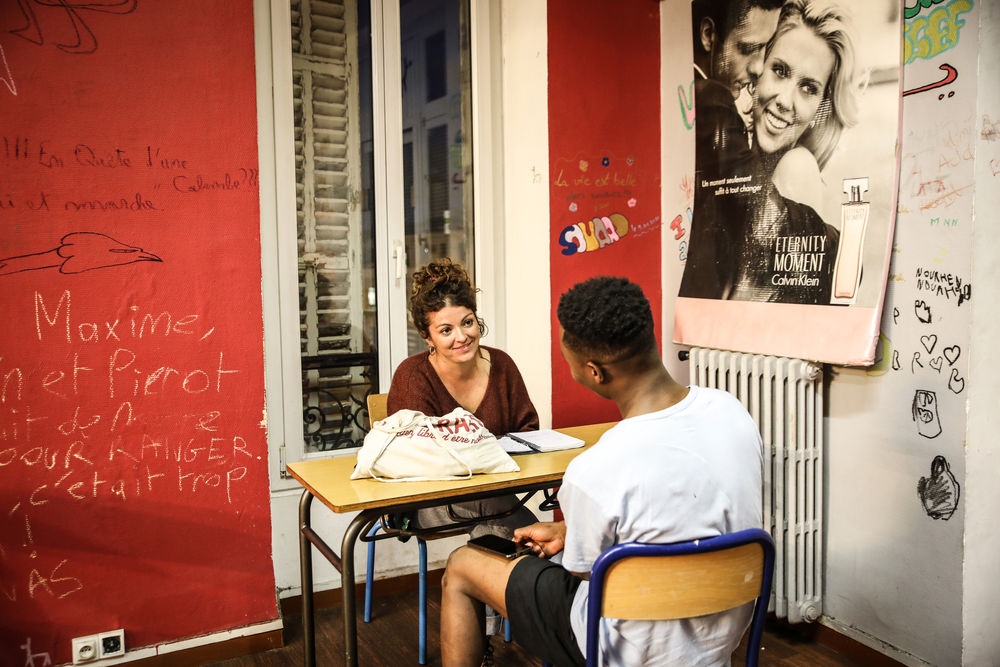This article includes the testimonies of two age-disputed unaccompanied minors who received medical care by MSF in a shelter run by MSF or in a squat in Marseille.
Seydou*, 16 years old, Côte d’Ivoire
 Seydou is an age-disputed unaccompanied minor, who currently lives in a squat in Marseille. He arrived in France passing through Morocco and Spain. MSF offers financial and medical support to the squat which currently hosts 20 age-disputed unaccompanied children, and which is managed by a local association called ‘Collectif 113’. © Mohammad Ghannam/MSF
Seydou is an age-disputed unaccompanied minor, who currently lives in a squat in Marseille. He arrived in France passing through Morocco and Spain. MSF offers financial and medical support to the squat which currently hosts 20 age-disputed unaccompanied children, and which is managed by a local association called ‘Collectif 113’. © Mohammad Ghannam/MSF
If I went to school, I would be thinking about my future rather than looking back at the past
My name is Seydou*, I am 16 years old and I come from the Ivory Coast. My father died when I was a child and my mother lives in a village far from the capital. I don't manage to contact her very often, because she doesn't have a phone and we are obliged to rely on other people to speak sometimes.
In January 2022, I took a boat from Morocco: a trip I want to forget. However, this was the first question I was asked by the assessors from the child protection services. I had just arrived in France and I wanted to forget everything, but no, they insisted to know everything about the trip.
I wanted to forget everything
The most difficult part of my journey was the passage through Morocco. I was locked up for weeks in a house with other children and men. We went through the desert and the trip was incredibly difficult: I was in a truck with tinted windows with dozens of people, I couldn't see anything.
When we arrived in Laayoune, on the Atlantic Ocean, and we had been travelling for 16 hours. At the seaside, they asked us to board a dinghy. On the boat, I didn't know where we were or in which direction we were going, and I was shaking with cold! A Spanish rescue boat picked us up in the night and we were transferred to Santa Cruz de Tenerife.
I was rejected because my story was not detailed enough
When I arrived in France, telling the assessors about my journey made me live through the trauma again: I wanted to start a new life, but I was asked to tell them everything I had experienced. I didn't do it, I was tired, and I wanted to forget.
So they went after my documents. I only had copies with me. I explained to them that I could get the originals by contacting my brother who lives in Abidjan. I told them the whole truth and they could check for themselves that I was not lying! Finally, I was refused on the grounds that my story was not coherent, not detailed enough and that my documents were not valid.
Living on the street cannot be an option
Despite everything, I was very lucky. If the ‘Collectif 113’ hadn't taken me in, I would have stayed on the street. Life on the streets is full of dangers, there is trafficking and when you are left alone, you can be caught up in malicious networks.
Since June 2022, I've been part of the ‘Collectif 113’ and I spent a few months in the squat on the Canebière [a popular street in Marseille]. In this squat, I am supervised by educators. The fact that I can for example walk to the central station, go to the market to do some shopping or take a walk around the neighborhood, makes me feel free as I don't feel threatened like I was in Morocco.
I want to imagine a future and forget about the past
But apart from that, I couldn't fulfil my biggest dream: going to school. I want to find a job, study and start a new life, have friends and go out with them. Often the memories of my journey come back. If I went to school, I would be busier thinking about my future rather than looking back at the past.
Jahan*, 17 years old, Afghanistan
 Jahan is an age-disputed unaccompanied minor, who currently lives in MSF shelter in Marseille. He walked more than 6,500 Km through the Balkans before reaching France. ©Mohammad Ghannam/MSF
Jahan is an age-disputed unaccompanied minor, who currently lives in MSF shelter in Marseille. He walked more than 6,500 Km through the Balkans before reaching France. ©Mohammad Ghannam/MSF
I walked over 6,700 kilometers from Afghanistan
Jahan is an age-disputed unaccompanied minor, who currently lives in MSF shelter in Marseille. He walked more than 6,500 Km through the Balkans before reaching France.
My name is Jahan*, I am 17 years old. I have been in the MSF shelter for 8 months already. I arrived in France about a year ago. I have walked more than 6,700 kilometers and travelled through 11 countries.
I left my hometown, Tizin, in Afghanistan when I was 13 years old. Tizin is located in a valley surrounded by mountains, I myself have raised goats. It's a small village, but with beautiful scenery!
My father was a policeman and a brave man. He died when I was 9 years old, bandits killed him. I never knew my mother, she died after I was born. I was raised by my sister, who is 10 years older than me. When I decided to leave to look for a better future, she accompanied me to the station and put me on the bus and we looked at each other through the window one last time.
In Iran, the police used to beat us on the head with sticks
From Tizin I went to Surobi, then to Kabul and finally to Nemruza. From there I went to Iran. Iranians don't like Afghans very much and we were attacked by the police for no reason! We were just walking, and they were coming towards us to beat us with sticks directly on our heads. It was one of the hardest countries I've been through.
From there I was able to move by tuk, but the rest of the way I walked. Sometimes we walked for days without stopping in the mountains...10, 12 days until we were exhausted. We stopped in villages, sometimes in the countryside to eat roots, herbs, tomatoes.
From Iran, I continued to Turkey. There I worked for 6 months. From Turkey I went to Bulgaria. From there I went to North Macedonia. Another country, where I was beaten a lot by the authorities at the border. Then I went to Serbia, where I spent about 5 months. From there I also tried to cross the Romanian and Hungarian border, but it was not easy at all!
At the borders of Europe, I got beaten up a lot
The border police are aggressive. Once I was caught with other young people in Hungary, we were beaten all over our heads, legs...and they put us in a car with tinted windows. Then the police took us to the other border and kicked us out of the car.
On the borders of Europe, I saw people dying and I experienced a lot of violence. I saw a person fall in front of me, he had collapsed from exhaustion and injuries...we had to run to get away from the police, we couldn't help him up. This is inhuman!
So we decided to go to Bosnia-Herzegovina, then Croatia and finally Slovenia. In the last two countries, I felt relieved: I was in Europe and I was in safe countries, where they were no more concerned about me. From Slovenia, I then arrived in Italy: I went through Milan, Turin. I only stayed 10 days in Italy. Then we continued the journey to Montpellier, where I stayed for three days.
In Marseille, I had a very difficult time
I came back to Marseille, where I slept for two days at the Gare Saint-Charles and I didn't eat anything during that time. Then I spent a very difficult month in Marseille, sleeping in a tent on the street. I had no clothes and only ate cakes that a woman brought me from time to time. I was then referred to the Child Welfare Office and stayed in a hotel for a while.
The assessors told me that I was lying about my age. I was refused because of my documents. They asked me for the taskera, but I told them I had left it in Afghanistan. With the arrival of the Taliban, I could no longer ask my friends for these documents. I was put back on the street.
I met volunteers from an association who helped me to find refuge with solidarity hostels. I was hosted for several days by a family in Arles. I had a great time with a young couple, they were very nice, but they couldn't put me up for long. When they went on holiday, I was referred to the MSF shelter by a social worker.
I want to become a policeman, like my father
I have been with MSF for eight months and I have started to go to school. I am learning French, even though it is very difficult. I already speak several languages: Pashto, Dari, Urdu, Farsi, Hindi, Baluchi, Turkish and French!
I study carpentry and my teacher was surprised that I already know how to build doors and windows. I learned it when I was in Turkey where I worked to survive. If I work hard and learn French well, maybe one day I can become a policeman, like my father.
*Names have been changed.



